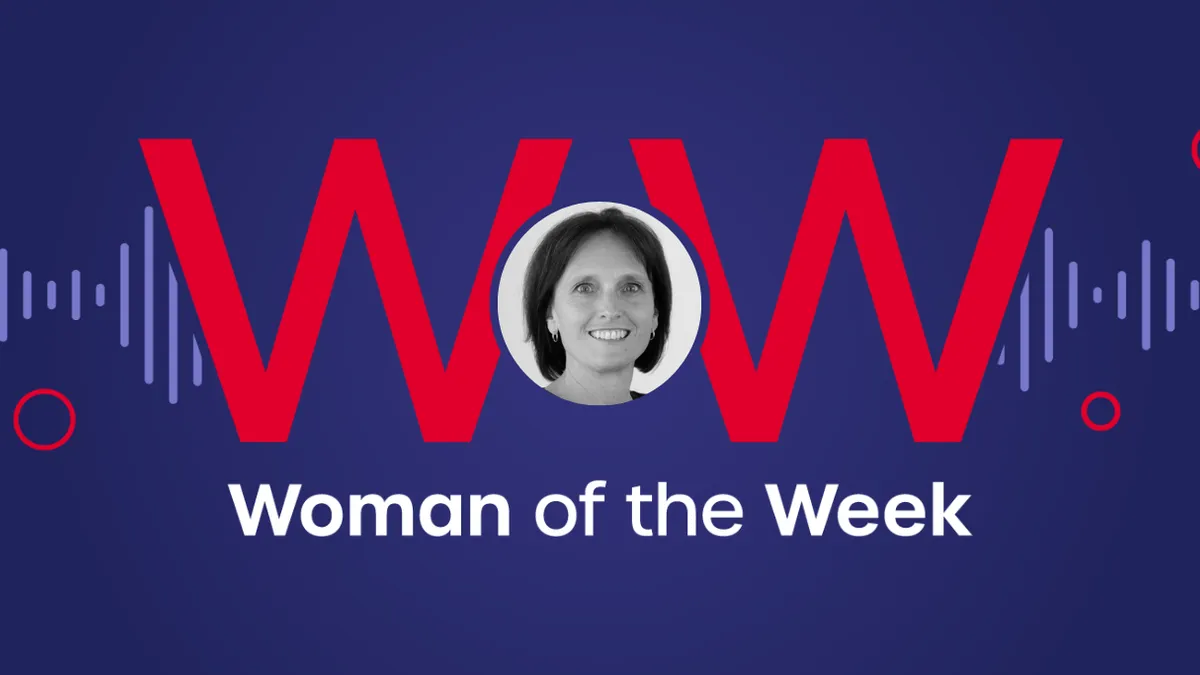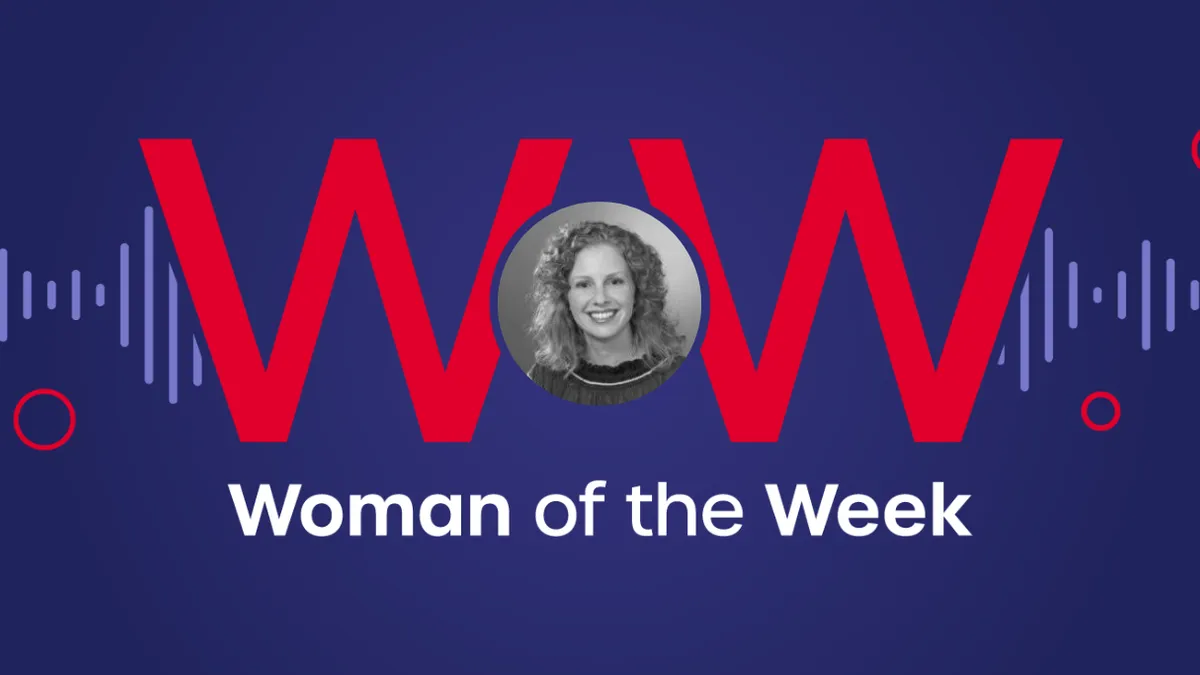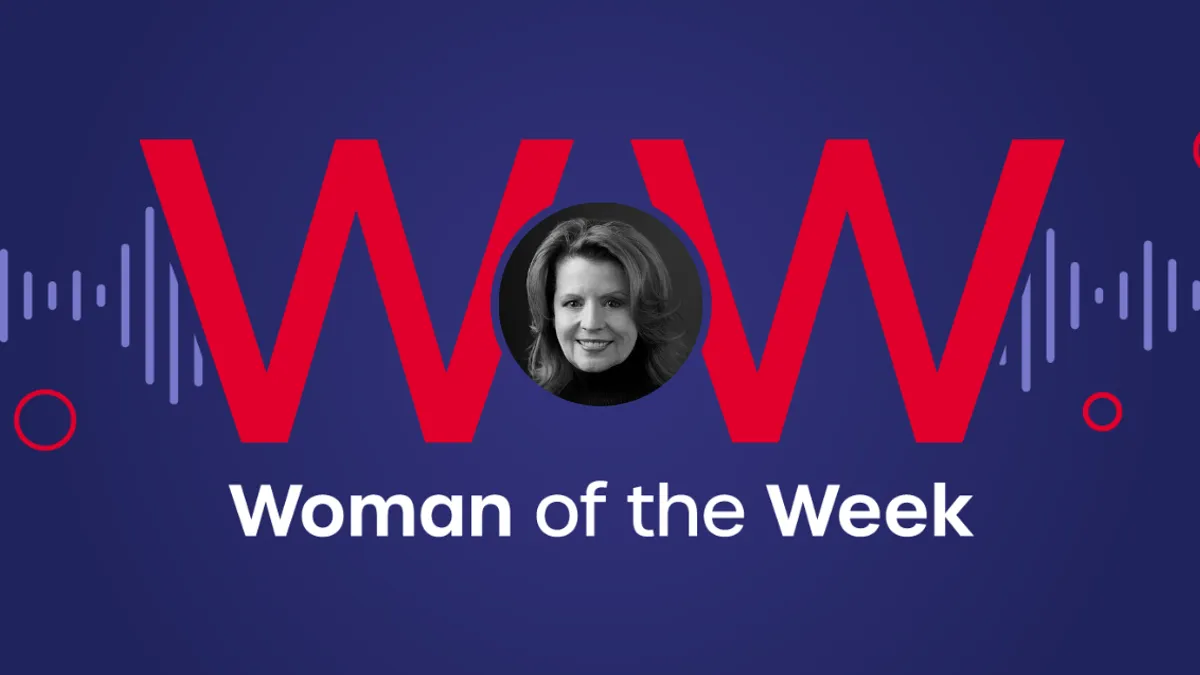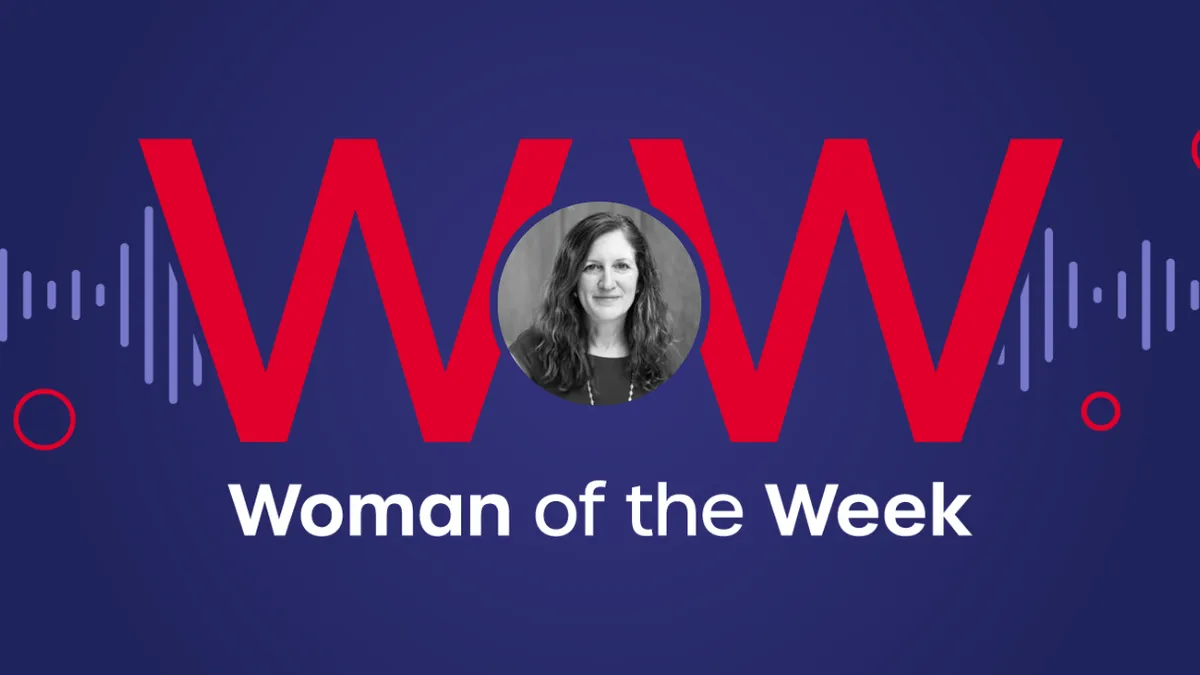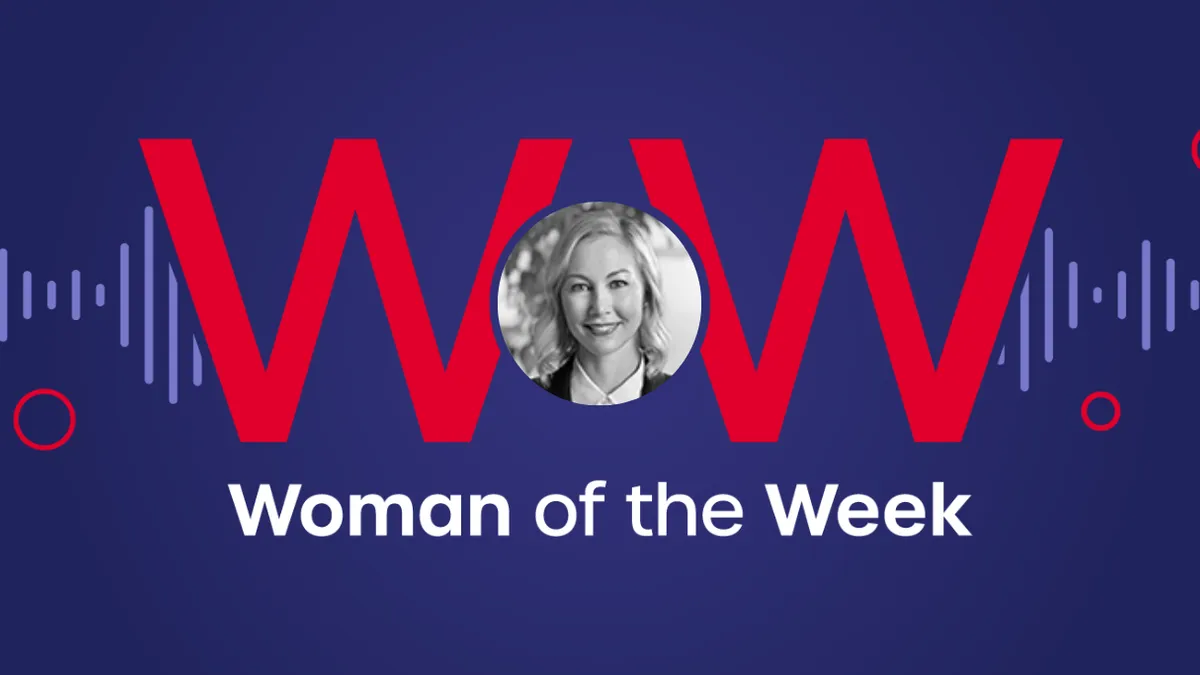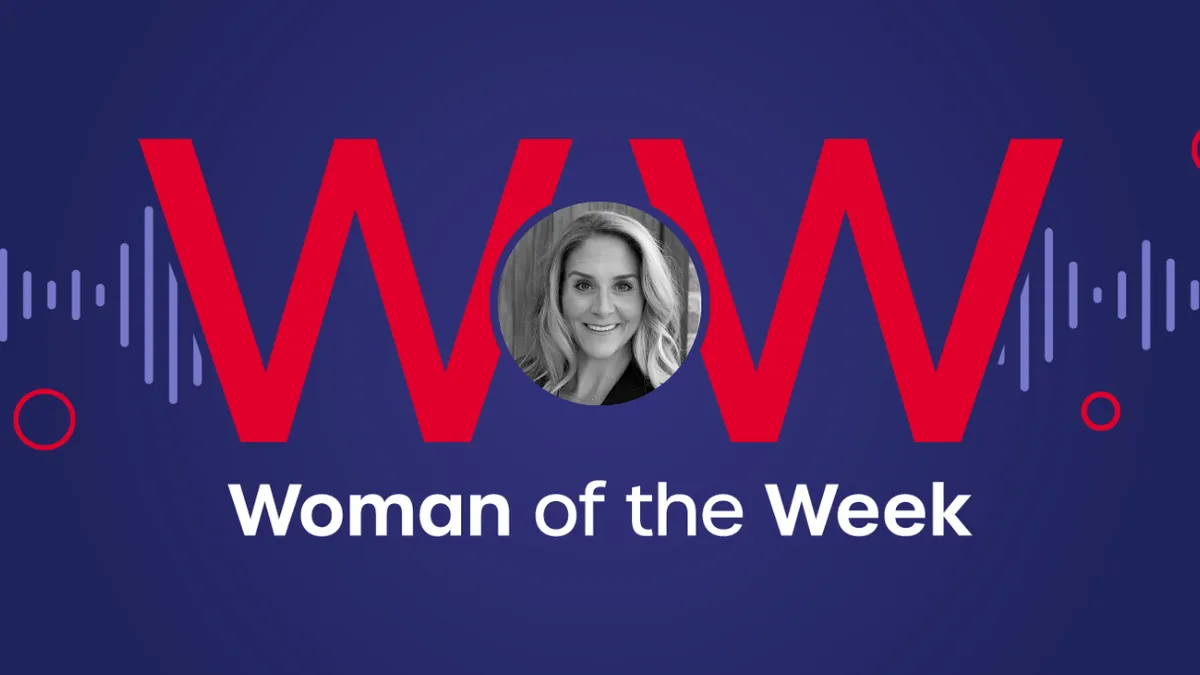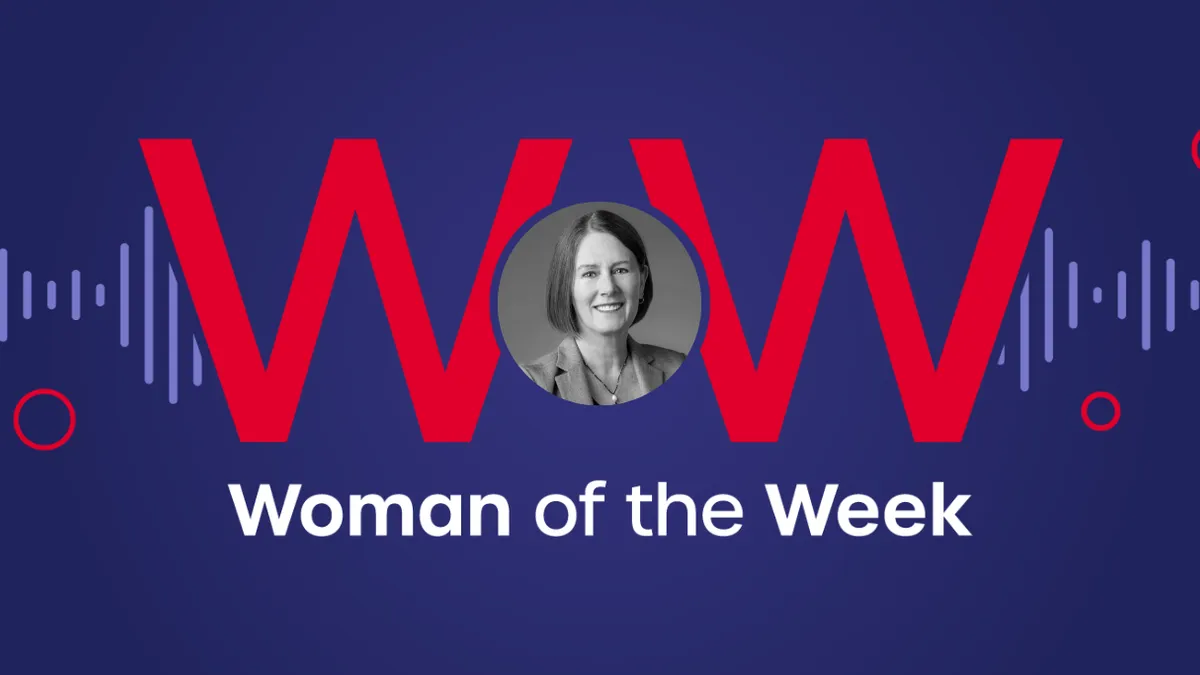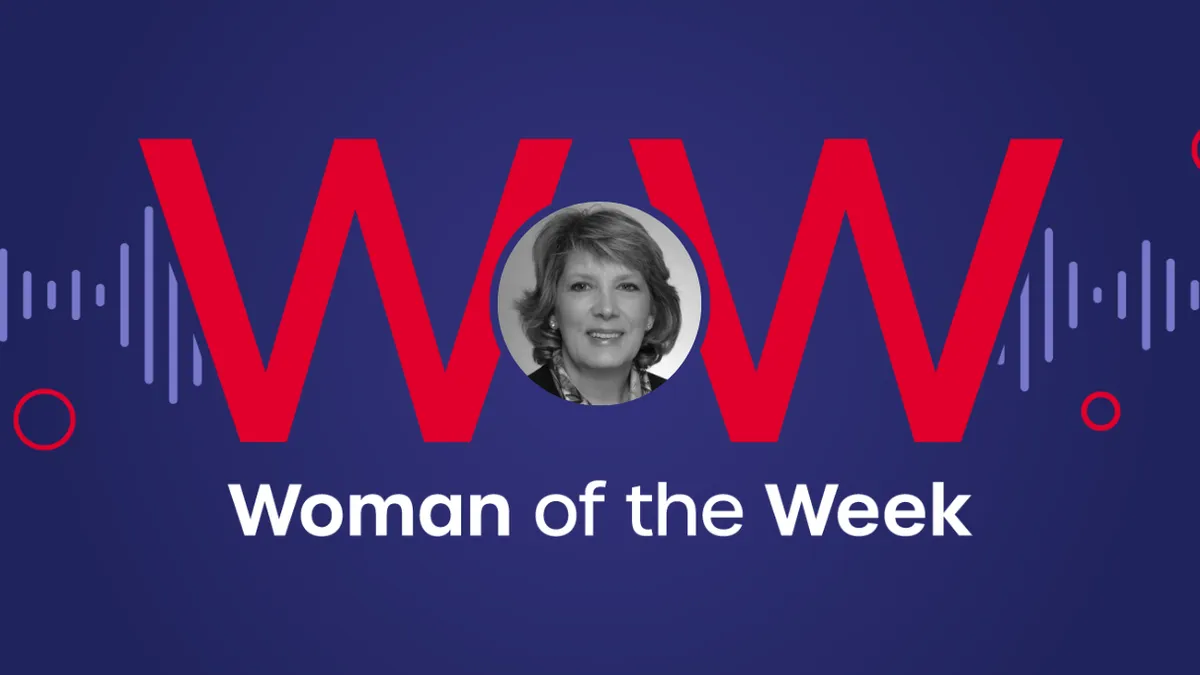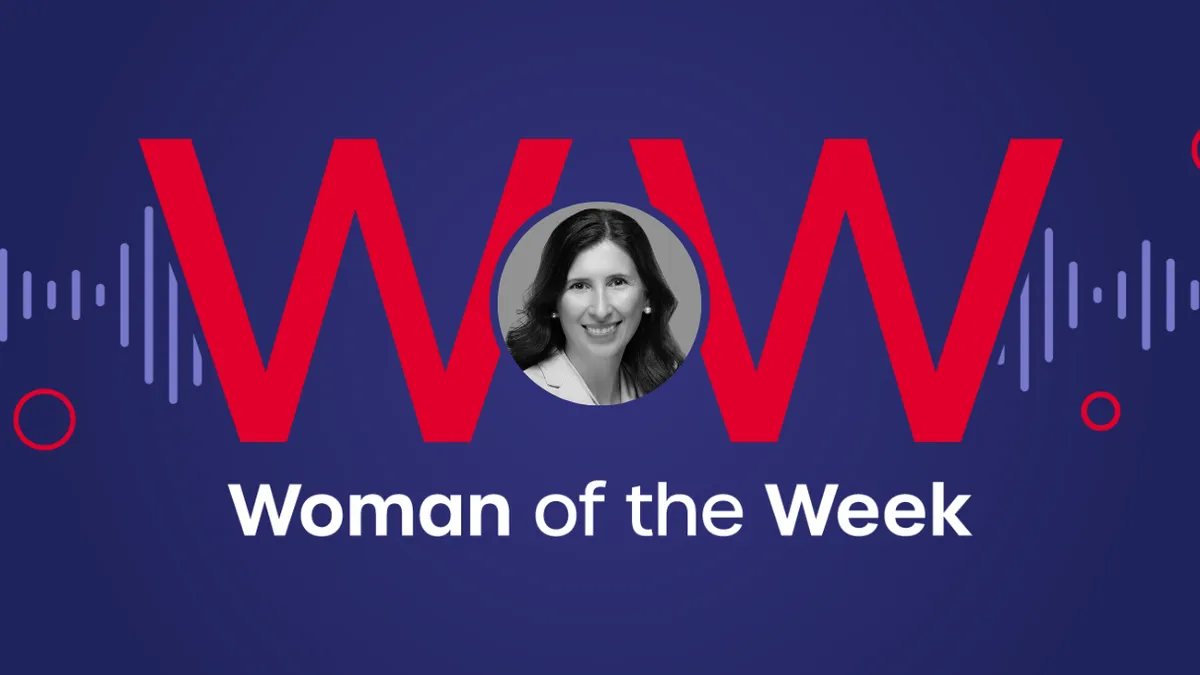Welcome to the Woman of the Week podcast, a weekly discussion that illuminates the unique stories of women leaders who are catalyzing change throughout the life sciences industry. You can check out all our podcast episodes here.
The entrepreneurial route is not for everybody, but when opportunity knocked, Jennifer Good answered the call. Ten years later, the CEO and president of Trevi Therapeutics said starting the company was her “wow” career moment.
In the early stages, she and co-founder Dr. Thomas Sciascia didn’t put together a business plan. They didn’t have financing lined up. There wasn’t a “whole lot of forethought” at all.
“We both decided how much of our own money we were willing to invest to try to make this happen, and we did that,” she said. “Looking back 10 years later, I’m so glad, but at the time it wasn’t so clear. It was a scary time. I was literally sitting at my kitchen table, paying the bills, and remember thinking, ‘Whew, this could be a huge mistake.’ Looking back now, I feel so proud of myself that I was willing to do that and build out what we have here.”
Today, Trevi’s lead (and only) molecule is Haduvio, an oral version of nalbuphine ER, which Good was able to purchase from Penwest Pharmaceuticals, where both she and Sciascia held C-suite roles before the biopharma was acquired.
Good recognized Haduvio’s potential, noting the molecule was “unfinished business.” After negotiating the purchase, she recalled calling Sciascia to tell him, “We’re the proud, proud owners of lots of data and now we need to figure out what to do with it.”
Over the course of the next decade, the company began a number of clinical trials for Haduvio for chronic cough conditions including interstitial lung disease, refractory chronic cough and idiopathic pulmonary fibrosis (IPF).
“We took a strategic decision that our primary focus as drug developers was going to be on the whole chronic cough space. There’s a big unmet need there,” she said. “Our drug is broadly in the opioid class, but it’s a mixed agonist antagonist. We wanted to get away from all the addiction and abuse problems in the opioid space.”
Good said the company had “an amazing 2022,” with positive readouts for two of its lead programs.
“The data in our IPF cough program was probably the best data I’ve seen in my career,” she said. “Off that, we were able to raise about $120 million. We head into 2023 with a really ambitious clinical plan around advancing IPF cough, also refractory chronic cough, and finishing a couple of other important safety studies. This is the fun part of what we do.”
In this week’s WoW program, Good shares lessons learned as an entrepreneur, the benefits of having a mission-driven culture to solve big challenges and why she is passionate about sending the elevator back down for the next generation of leaders.
Welcome to WoW, the Woman of the Week podcast by PharmaVoice powered by Industry Dive.
In this episode, Taren Grom, editor-in-chief emeritus at PharmaVoice, meets with Jennifer Good, president and CEO, Trevi Therapeutics.
Taren: Jennifer, welcome to the WoW podcast program.
Jennifer: Thank you for having me. I’m excited to be here.
Taren: We’re excited to have you. I love talking to entrepreneurs. You co-founded Trevi more than a decade ago. What led you to embark on this entrepreneurial journey?
Jennifer: Well, I was previously running a company called Penwest Pharmaceuticals, which was acquired by our partner. And there was an asset inside of Penwest that has sort of unfinished business for the chief medical officer and myself. My co-founder is a neurologist named Dr. Tom Sciascia, and we had worked together for a number of years. There was a drug inside of it which was not the focus of the acquisition; and Tom and I had had particular interest in it for a lot of reasons, which we’ll probably talk about is the basis of Trevi. And so when that acquisition closed, Tom and I sort of said let’s go see if we can try to get our hands on that drug. I wouldn’t say there was a lot of forethought or planning, but went down and I was able to negotiate out that asset. I joked to Tom, I called him, “We’re the proud, proud owners of lots of data and need to figure out what to do with it.” But really it was an opportunistic thing and we sort of went and got it and then thought about, “OK, where do we go from here?”
Taren: That’s funny, you’re a proud owner of a lots of data. You said something in it that has made me laugh because there wasn’t a lot of forethought. I find that sometimes entrepreneurs take that leap. It’s a calculated leap, but still it’s a leap without thinking “Ooh” all the way through it because it’s almost like if you knew what you didn’t know it’s better, if that does make sense.
Jennifer: No, you’re exactly right. It was sort of an opportunistic thing. We felt there was some unfinished business. We didn’t put together a big business plan. We certainly didn’t have the financing lined up at that point, but we both sort of decided how much of our own money we were willing to invest here to try to make this happen, and we did that. So looking back now 10 years later, I’m so glad, but at the time it wasn’t so clear for sure.
Taren: So let’s say looking back, anything in hindsight you would’ve done differently?
Jennifer: It’s interesting. Science is never a linear journey and so we had a hypothesis around this molecule that it could work broadly in a lot of conditions. And I have to say 10 years later, that was indeed true. It works in a lot of conditions. Because of that though, there were trials that were done that we didn’t end up advancing for business and commercial reasons. We’ve now honed in on a business model. As sort of the person in charge of the money for sure, I always look back and think, ‘ah, should we have spent that money.’ But it was not obvious when we started where this drug would work and what were the right studies and indications. So as I look back, it’d be easy now to get here quicker and cheaper, but I think the journey was good and we had success, and I think it was just all part of the learning process.
Taren: Fantastic. And, yeah, it’s easy to be a Monday morning quarterback, right?
Jennifer: Yeah, for sure.
Taren: But living through it all at the time, you make the best decisions you can make at the time. What have been some of the biggest ahas for you in starting up a company?
Jennifer: That’s a great question. So I would say when you start a company, it really is a lifestyle; it’s no longer a job. I had been in a lot of jobs, and even when I was in the C-suite and running companies before, you’re still sort of working for a company. You’re in a job description. When you actually go off and start your own company, you not only put your own money in but you convince other people to put their money in, which are typically friends and family and then investors that knew you. You also go hire employees who leave jobs and take a risk on what you’re doing. So it’s very mission driven. I would say you get in-house, it tends to be a really lean team. You feel everything so acutely. Everybody’s sort of involved in every decision. You’re solving a lot of challenges.
But at some point, and I would say this is where the aha moment was, that’s where the real innovation happens. People care a lot and they’re thinking deeply and they’re being very creative about how they problem solve. And you tend to assemble a group of people who aren’t afraid to take some risks and roll up their sleeves and make it happen. And so there was a moment when I realized this is no longer a job for all these people. They’re here sort of really being mission driven. And I would say even 10 years later, that permeates our culture here and it’s a really fun environment to work in.
Taren: I love that mission driven, and it is. Like-minded people are attracted to that because they want to be part of something that is mission driven.
Jennifer: Yes, they’re builders. I mean they’re risk takers, they’re builders. They want a framework. People like a boss, they want a job description, they want a framework, but generally within that they’ll give a lot of themselves. And I think for the people that are wired for that, you really do get the best in people and it creates a really fun environment.
Taren: That’s fantastic. Any advice to future entrepreneurs? Any lessons learned along the way that you say do this, don’t do that?
Jennifer: So I think you have to do a good assessment of yourself. I’ve had this conversation with a lot of entrepreneurs, people considering it. We’re based here in New Haven, so I run across a lot of Yale people, Yale professors, people thinking about starting companies. I think the biggest question you have to sort of ask of yourself is “Am I willing to take a risk” because a lot of things don’t work in this business. You often don’t get paid for sort of the first year of trying to build something because you’re putting any cash you have into advancing the business. So I always say to people, “Are you in a position in your life where you can take a risk for a bit and see if this can play out?” and I think that’s the biggest piece of advice when that happens. I think it’s all about hiring those whatever the number is 1, 2, 3, 5 key people who don’t want to sit inside a job description in a box. They want to roll up their sleeves and help you turn this into a reality.
So I would say those are the two biggest things. You’re willing to sort of take some risk knowing it could fail, and that you’re willing to go bring in a team of people who are willing to really try to make it a reality.
Taren: I love that. I’m fascinated by the backstory of company names. How did you settle on the name Trevi?
Jennifer: I love this question so much, so thank you for asking it. The summer that Penwest was being acquired, I had a trip planned to go to Italy and specifically Rome because my oldest daughter was studying abroad there. So I was going to go travel at the end of her trip for two weeks with her. I knew at that point in time my company was being acquired, which I had been inside of for many years and had kind of grown up there. And I remember standing at the Trevi fountain with her and I tossed in a coin and I said, “I don’t know what I’ll be doing next time I’m back here, but I’m going to make it something fun.” It was really a cute moment; she hugged me and said, “Oh Mom, I love that.” And so when I came back and the company transaction closed, and it was actually about six months later that Tom and I were able to acquire the asset, we were brainstorming names and I remembered my Trevi moment and I brought it up to Tom. He liked the name, we were able to get it, and that’s been the name and gotten a lot of good feedback on it. People like it, it’s easy to remember. But that was the backstory to how we got Trevi.
Taren: I love that. It is so personal and it’s a great story. Thank you for sharing that with us. That’s wonderful. Let’s talk about the company’s pipeline. You’re focused on chronic cough and this is the product that came out of the Penwest, I’m assuming. Why this therapeutic area?
Jennifer: So we have one asset and it was the product I mentioned. It’s nalbuphine ER, we call it Haduvio. We only have this single asset that we’ve studied in different indications. The connection of all this is our drug is broadly in the opioid class, but it’s a mixed agonist antagonist. So this class of drug was developed to get away from all the addiction and abuse problems that are going on currently in the opioid space. It’s why Tom and I both had an interest, well I would say I had an interest in it because I thought it could be part of the solution here to the whole opioid crisis. Tom was particularly interested in the compound because it has broad activity throughout the body. It’s sort of in the brain, the brain stem which mediates coughing and breathing, spinal cord, the lungs, the skin. And so we looked at things like pruritus, which is a fancy word for itching, because of its sort of activity in the skin and also the brain. And also we were interested in cough because of the really rich pathway from the lungs up to the brainstem which mediates coughing and breathing. So we targeted that area really based on where we believe the activity of the drug would be.
Taren: Fantastic. So what are your goals for 2023 for the product?
Jennifer: We just came off an amazing 2022. We had two lead programs, both which read out positive, and the data in our IPF cough program was really…I mean that was wow data, probably the best data I’ve seen in my career. It was really exciting. It’s a condition we can talk more about, but very sick end-of-life type condition. So coming off of that, we were able to raise about 120 million dollars, which if you followed biotech for a while you know it’s been a tough sort of year to two years for people to raise money. So we feel very blessed by that. We head into 2023 with really ambitious clinical plan around advancing IPF cough, also refractory chronic cough, and finishing a couple other really important safety studies. So this is the fun part of what we do. Everybody’s heads are down really thinking through the right protocols, how we execute them well. We’ve got one of the four studies initiated. We’ll initiate the other three this year, and then those will start reading out the end of this year and roll out through sort of the end of next year. So heavy duty clinical work around sort of de-risking and just moving the program ahead.
Taren: Congratulations. That’s exciting. So a lot of I would say excitement, a lot of ‘yay, we did it, got through with those data readouts last year’; so what does this mean for the company overall? What does it mean overall?
Jennifer: So overall what we had to do last year, because we had a positive data readout in both pruritus which is I’d mentioned to you severe itching and also chronic cough and idiopathic pulmonary fibrosis. We took a strategic decision as a company that our primary focus as drug developers was going to be in the whole chronic cough space. There’s a big unmet need there.
IPF is idiopathic pulmonary fibrosis. It’s an end-of-life disease and 85% of these people suffer from really pretty severe coughing. I mean people can cough up to 1,500 times a day. It’s got impacts on their health outcomes overall. You can imagine you’re coughing that much, you are not going out in public. You’re not really being socialized. It’s hard to sort of stay in conditioned et cetera. So this is a big impact on these patients overall. So we took the decision that that will be where our development focus will be, our pruritus program, which is also a severe indication. We are looking for a partner to advance that and hopefully market it. So those are our plans for this year.
Taren: I had no idea that was such a terrible disease.
Jennifer: Yes. And it gets broader than that. So we are focused on IPF cough. There’s also other interstitial lung diseases which look very similar, also very end of life and very all-consuming for people tend to be elderly. We are also going to run a study in refractory chronic cough which is interesting. There’s a literature out there that 10-12% of people will suffer from some kind of chronic cough condition at some point in their lives. And we all know those people who have those coughs going on and it’s not always identifiable. And specifically what we’re focused on is what’s considered a neurological cough, sort of the link back to my neurology co-founder because there is a lot of cough. If you think about having a cold, that’s a productive cough. It’s clearing your lungs and we certainly don’t want to interfere with that response. What we’re looking at is when the brain starts getting involved and sending a neurological response back to wherever the disease is that results in this chronic coughing. It’s not good for your health and obviously really disruptive to people’s quality of life. So that’s where we will focus our efforts.
Taren: Fascinating. The science of that is fascinating. I never thought about it that way. Thank you for sharing that as well. So let’s get a little bit personal with you. Can you share a bit of your career journey that led you Trevi? You started off talking a little bit about Penwest where you grew up. Talk to me a little bit more about that.
Jennifer: I have a bit of an unusual track to CEO certainly in the biotech field, I would say. I actually out of college with an accounting degree. I went to work for Ernst and Young and migrated my way towards biotech and high tech sort of as my first career path. I was always interested in the whole tech side and I think to some extent it was always the sort of life-changing aspects of it, the risk side of it. I think early on I had a realization that I had a tolerance for risk that maybe not everybody had. So I spent about seven years there and then migrated over to continue my financial journey and was a controller of a bigger holding company that had many divisions. I ended up taking a transfer out into their pharmaceutical group that was Penwest and that’s where I started out as VP of finance and then became chief financial officer when we IPO’d that company actually at quite a young age, I think I was roughly 30. Stayed in the CFO’s job for a while and then ended up becoming chief operating officer, and then the last six years with CEOs. So really was a company where I sort of grew up and learned how to be an executive leader, and then ultimately that company was acquired. So it was from that springboard that I went off to start Trevi.
Taren: That’s fantastic. And so all those different experiences obviously are cumulative and putting you in a position of leadership within the organization as well as within the industry. As a woman CEO of a biotech company, do you feel that there’s additional pressure on you being a woman?
Jennifer: It’s funny, I wasn’t always so aware of it until there started being some good conversations around that topic; and then I actually was sort of like, ‘Oh, yeah, that’s interesting. That’s true.’ I mean even today, there’s a lot of meetings I go to. I went to something last summer, which I won’t name the event, but it was a big investor event. There was roughly 60 people, it was kind of an exclusive investor/CEO event. There were two women there. It’s funny, I was probably less aware of it when I was younger, I’m probably more aware of it now. I don’t know that it’s pressure, but you do always feel a little bit othered. I have to really kind of lean into it and remind myself I have a seat at that table that’s important and diversity’s important. So it’s something I think I’m probably more aware of now than I was as I grew up through the industry.
Taren: I get that. Yeah, it is oftentimes the end of one or end of two in that case. To that end, do you consider yourself to be a role model for the next generation?
Jennifer: I wouldn’t say I set out to be that. I was just trying to do a good job in whatever job I was in. I was also raising three kids at the time. I think there was a point though, and probably as I moved into starting this company, when I realized, “Look, there’s only so many women CEOs.” There’s only so many women CEO founders; that’s an even shorter list. I also sit on some company boards, so again another short list. And I also have two daughters. I realized that that’s part of kind of my collective experience and give back that I wanted to make sure I invested time in. So I’ve been quite active in New Haven women in bio, executive women in bio. I do a lot with the universities here. I actually with another woman CEP, we started a big internship program here in New Haven where the biotechs all bonded together and we hired over 200 interns so a lot of young women. So it’s definitely something that in the last several years I’ve become more mindful of and really tried to lean into that responsibility and helped women along the way.
Taren: That’s fantastic. Well, thank you for doing all that you’re doing with women in bio as well as laying the groundwork in a path for future generations to find their way because oftentimes probably when you were coming up, was there anybody who looked like you in the C-suite? Chances are probably not.
Jennifer: Right. I met a couple women along the way who had big impacts on me in that way and I do always think about them. I think what changed in my generation is the women in the C-suite ahead of me really couldn’t have families and a career, I think with my generation that fortunately has shifted and it’s gotten even better for my kids’ generation, a lot more flexibility. But that one is one sort of evolution. I think that was important that you didn’t have to give up having a family to be able to be an executive as well. You didn’t have a lot of time for yourself, it was busy, but you were able to do both which I think is important.
Taren: That’s fantastic. You touched on diversity a few minutes ago and I was looking at your C-suite and it’s very diverse. Was that intentional or by happy happenstance?
Jennifer: I have to say I fundamentally believe in diversity in all forms – gender, race, age. I just think getting a variety in any kind of setting just makes decisions and sort of overall things better. So as we hire here it’s definitely something I’m mindful of. We were having this great conversation on women, and I think women have come such a long way. Actually, I was on this panel and I had this black woman actually check me on that and say, “Things are better for white women but not for black women” and that was a moment where I had to sort of say, “You know what, that’s interesting. I had to think about that.” So that’s sort of been my next quest about how I hold a hand back to people because everybody’s looking for that start in life, someone to believe in them, someone to help grow them. It is something I think a lot about, probably don’t always get it right finding the right balance, but I’m proud of what we’ve built here. I think we only have about 25 people but you would find a very diverse crowd inside of Trevi here and I think it makes us better.
Taren: And I think that’s a great piece of self-awareness. Yes, it is better for white women; it’s not so great for black women nor Hispanic women either or other women of color. So, yes, in some ways we’ve come a long way; in some ways, we still have a long way to go.
Jennifer: Yeah. And it’s incumbent on women leaders to recognize that and try to be part of that solution. I just really have become aware of that and thought deeply about how to just contribute on that front.
Taren: Fantastic. How would you describe your leadership strengths?
Jennifer: I would say that sort of what you see is what you get. I’m very direct. I think I lead from a place of general sort of kindness and believing in people. I try to support people to play to their strengths. There was always this debate “Do you springboard off people’s strengths or improve on their weaknesses?” I’m a big believer in making people feel successful and then trying to support them on the things maybe they’re not as strong on. I stay very engaged and accessible, I think that’s a big strength, so I know what’s going on. I try to not meddle in things that I shouldn’t be in. At some point, I had to become aware that although I just feel like one of the team and a regular person, you do carry a CEO title and sometimes it’s not helpful when you’re mucking around and things that somebody shared with you.
So I learned that lesson. I think people come to me because they trust that I’ll listen, give them advice, and then only get involved if they need me to. So I think over time that’s built credibility. I would say the other big thing, and I thought hard about this when I took the CEO’s job because I wasn’t sure I wanted it way back when, is that I needed to do the hard parts of this job and that’s holding people accountable. That’s moving people out that aren’t doing the job they should be. We’ve all worked for people that aren’t willing to do the hard parts of that job and it’s extremely frustrating because it creates sort of baggage inside an organization that nobody else can fix. And so I think people look at me and they know whether it’s sort of holding people accountable or there’s difficult things in the company and I’ve got to go outside and try to fix it. People recognize that I’m willing to do those hard things, that’s part of what this job entails. So anyway I would sort of ramble around that and say those are my strengths in this role.
Taren: I have to say, Jennifer, that is a very real thing you just said because I haven’t heard it articulated that way before about holding people accountable and making that conscious decision of saying if it has to be done, I’m going to be the one to do it, because it’s not easy to do that.
Jennifer: It’s very hard. It creates a culture though. I’ll tell you, I find that if you get even one person in a small company who’s slacking, it’s so apparent because we only have one person doing sort of each function. It’s super distracting to everybody else because they get almost mad that people aren’t sort of owning up to their job. And so I learned long ago I just need to deal with that. And I do it in a nice way, I help people land on their feet, but that just needs to get cleaned out. And I would say because of that, we’ve got a really high performing team here and a lot of generally happy employees because of that.
Taren: That’s fantastic. Everybody thinks it’s great to be sitting at the top of the pyramid, but along the way there’s a lot of hard jobs that need to be done. Speaking of building high-performing teams, what are some of those keys that you employ to make sure your teams are functioning at the highest level?
Jennifer: And again, this is a small company. I would say really being open and clear with people about the strategy, the deliverables that our shareholders and board are holding me accountable to so that they understand them clearly and I resurface those regularly so it’s always front and center. Again, I think empowering people. Another piece of this that’s not to be underestimated is when people come to work, they’re a whole person. They spend 8 or 10 hours here, whatever it is, but they’ve got things going on in their own lives and there’s moments in every employee’s life where they need their company to just hang with them a little bit whether it’s a sick child or a parent dying or whatever. We can go on and on about all the things that sort of we can’t be a hundred percent in.
COVID certainly tested all of us on that. When you can lean in and support those people in total that, “Look, this isn’t just about the work you do here, I care about you in totality as a person” and build an organization that does that. It’s amazing the power in that. And I remind people that it’s not always just about getting the most out of people when they’re in the building. It’s really about supporting people on as individuals and being a holistic person. They bring them their best selves to work.
Taren: Absolutely. You touched on something, it’s that empathy piece that you were describing there that often in the past was almost considered a soft skill, but we bring more and more leaders lean into this noting that it is a strength.
Jennifer: Yep, I agree. And I think we all talk about this next generation of workers and they’re just not going to stand for sort of the whole show up to work, don’t say anything, work lots of hours and watch your boss do that; that just doesn’t fly. They’ve got a much bigger lens on the world and I’m excited about that to see what that generation does. But I do think you have to be mindful then of supporting them holistically as individuals. Now the flip side of that is they still have to deliver and they’ve got accountability to their job, but assuming they can do that I think that you can support people in whatever their different sort of needs are as individuals.
Taren: Perfect. You touched on this a minute ago and I want to explore it a little bit deeper. The folks who have had an influence on your career, maybe they were a mentor or a sponsor, what kind of impact did they have for you?
Jennifer: I have always used my board of directors and I take my board construction really seriously because when you’re CEO there’s some things you can’t always talk broadly through the organization about and I need people that sometimes when things are tough here that I can pick up the phone and say, “Gosh, I’m really struggling with this.” So I have some incredible people on my board and I actually have two members on this board of directors that were on my prior company board of directors as well. They’ve been mentors for a long time and these are successful leaders in this industry in their own right. And again, I have pretty good board diversity as well.
And so I would say that generally when I look back on people who have had a big influence on me, it’s people that are on my board, and importantly I seek advice and counsel. Some people just kind of try to keep their board happy and off their back. I really use my board in a way to help me think better, struggle through things. I try to be pretty transparent about what’s going well, what’s not. So I guess some advice I’d give to people that are new entrepreneurs is really be thoughtful about your board of directors and put people on it that bring skills and advice that you maybe don’t have because they’ll be really helpful to you as you work through the different problems of building out a company.
Taren: Absolutely. And part of building out that company is you notice that you’re a public company and taking it public and that’s a whole different set of pressures.
Jennifer: Yes.
Taren: Tell me about that experience. When did you make that decision to go public?
Jennifer: So it’s actually a funny story again, all my war wounds. I ran a public company prior to this and there’s a lot of work that goes into running a public company. I remember at the end when it got acquired saying, “Ugh, I’m not running another public company. I’m going to just go off and build private companies” and that’s what I did. I started this company, we were private, did our series A, B, and C. But the reality is if you have success at some point, you tap out of the venture space and you need to IPO so that people can get liquidity. So that was kind of our journey. I had been there before through sort of Penwest was a publicly traded company.
So when it came time to IPO Trevi this was something I knew how to do. I knew it was the obvious time and got liquidity for our shareholders who had been engaged in the company. And there’s been a lot of new rules put into place, the JOBS Act, that make that a lot more targeted and sort of not so difficult on a company, but it does up the bar. Not everybody’s sitting in the boardroom and has all the facts. So you’ve got to try to help shareholders understand the risk without being able to tell them every single thing which you can do in a private board.
Taren: Right, absolutely. Fascinating. We talked a little bit about this too, about sending the elevator back down or lending a hand to the next generation. Do you consider yourself to be a mentor as well as a role model? I mean we talked about the role model piece of it, but are you a mentor?
Jennifer: Yeah, probably. And I would say that probably started with I’ve sort of alluded to this through this. I would say a big impact on who I am as a leader is the fact that I’ve always taken my responsibilities as a mom as my number one priority. I always think of Jackie Kennedy’s line, “If you don’t raise your kids right, nothing else matters.” And so I had two daughters and one son, and I certainly felt a responsibility always to be a good sort of role model/mentor to them. They’re now all in their 20s. I’m trying to help them find their own journey and think about their strengths and what’s good for them. So I would say that that sort of started naturally at home, but as I mentioned I sort of went through this awareness that I had things to offer to certainly the younger, really talented generation coming along or people that wanted to get out and take a risk and start something. And so I try to be really generous with my time. I get a lot of inbounds about “Could we grab coffee?” or “Would you have a little time to chat with me?” I do try to do that for people and give them at least my best views on things because it is so helpful as you’re thinking through if something’s right for you.
Taren: Absolutely. And I would expect that you get a lot of that interaction too through your involvement with women in bio, correct?
Jennifer: Yes, I do. Exactly. And then also being connected to Yale. Yale’s quite active; they’ve got a new person that’s running their whole innovation center who I’m connected with. So, yeah, a lot of just interaction. There’s a great business community that’s gelling in New Haven around life sciences so I would say generally there’s just a lot of energy and sort of people in the mix of trying to think about how to be innovative and start things.
Taren: Fantastic. What’s the one thing that most people don’t know about you?
Jennifer: Well, I just talked about it; I would say that I was sort of a mother first and an executive second. It was a busy hectic time as I raised three kids and sort of moved along through the food chain. So that’s sort of the obvious answer and I think now that’s not so sort of unique, although when I started into that world it was certainly. My husband stayed home with our kids, so we had a bit of a non-traditional family in that way. So that’s kind of I think the obvious framework I would say. Maybe some fun fact that people don’t know about me, I’m a huge fantasy nerd so I love Lord of the Rings. I sat and watched it two nights ago instead of doing my income taxes. So any chance I get to watch Lord of the Rings, Harry Potter, Star Wars, that’s definitely sort of my downtime moment.
Taren: I love it. That’s so fun. I’m also a big Harry Potter and Star Wars fan, not so much Lord of the Rings.
Jennifer: So you totally get how much joy there is.
Taren: Yeah, absolutely. You talked about having a non-traditional kind of family and growing up through raising the kids and having the big job, et cetera. There’s this thing out there about life-work balance for women. Is there any such thing as a work-life balance?
Jennifer: So that’s interesting. I think when I was growing up sort of in this business and raising three kids, I did not have good work-life balance. I had good balance I think between work and my family like I made that a priority. What I had zero of is any time for myself. It was sort of like 20 years later I lifted my head up, which fortunately I’m in that phase now, to realize “Wow, I can actually decide what do I want to do.” And this has been a really fun time for me to sort of think about all those things as an adult. As far as work life, I always really made a point of being home with my family. I mean, I had my first daughter when I was 27 years old, so not spending time with my kids just was never an option for me.
So I am very efficient at work, I’m very focused. I sort of took on jobs the moment that I knew I could handle both. And my kids were pretty spaced out; my oldest and youngest are 10 years apart so that certainly helped. I would say the one thing that was challenging is I’ve always traveled a lot because I’m a big believer in sort of being on the frontlines, if you will, so that’s obviously a balance. But in some ways it made my kids independent too. They knew how to fend for themselves when mom was gone for a few days.
Taren: So that’s a good part too of it, right? That’s the silver lining on that.
Jennifer: I have to remind myself of that. When they’re so fiercely independent now I’m like, “Ah, sometimes you drive me crazy” and it’s like “Well, they learn this from me so I can’t really complain.”
Taren: That’s very funny, Jennifer. Well this has been a fantastic conversation and thank you so much for sharing so many great stories and so many great insights in how to manage like a big career and a big life and raise three kids, et cetera. But I’m going to challenge you to identify a WoW moment that either changed the trajectory of your career or has left a lasting impression on you.
Jennifer: Yeah, I love that question. Again, looking back sort of on the different things I’ve done, I would have to say it was when I decided to take that risk and start a company from nothing. I mean I was literally sitting at my kitchen table, paying the bills out of my checking account. It was a scary time. And I remember thinking, “Whew, this could be a huge mistake.” Looking back now, I feel so proud of myself that I was willing to do that and sort of build out what we have here and I look at other people building their careers here and getting on their way. And importantly treating really significant unmet medical needs, that’s really such an important part of what we do in this business. I just feel really proud of that. So when I look back on my sliding door sort of WoW moment in my career, that will be it.
Taren: I think that is a fantastic WoW moment because not everybody has the wherewithal, the guts, the intelligence, all of that to make it happen and to be successful and especially for a woman to do that. We know the statistics about starting companies and they’re dismal. So for you to have made it is really quite something you should be proud of, so congratulations to you.
Jennifer: Thank you. Well, we’re never there until my shareholders all make money, it’s survive in advance. But, yes, thank you. I’m proud of what we’ve built and I look forward to hopefully continuing the journey here until we can get this drug to the market.
Taren: I’m willing to toss some coins into your fountain. I think it’s fantastic, so good for you. You talked about now being an adult and doing now things that you want to do; that feels very joyous to me. Are you finding that to be true, that you’re finding more joy right now in life?
Jennifer: Yeah. I think it’s been really a fun exploration. You think a lot about what are the things I want to do and not sort of what does everybody else around me want to do which is sort of how I led the rest of my life, and it has been very joyous. I think sort of the “aha” moment in that is sometimes that’s just being quiet, sitting with a book or enjoying life with a friend which I know sounds so cliché but when you’ve been a busy person sort of on the move constantly, it is something you learn to give yourself permission to do. And it’s amazing how much joy there is and just tightening up your circle and taking some downtime and resting and doing the things you like to do. So that has been really enjoyable for me.
Taren: Fantastic. Well, Jennifer, that was it. Thank you so much. You have been wonderful.
Jennifer: Thank you. I appreciate you having me. This was a lot of fun.
Thanks for listening to this episode of WoW, the Woman of the Week podcast. For more WoW episodes, visit pharmavoice.com.


 Podcast
Podcast

